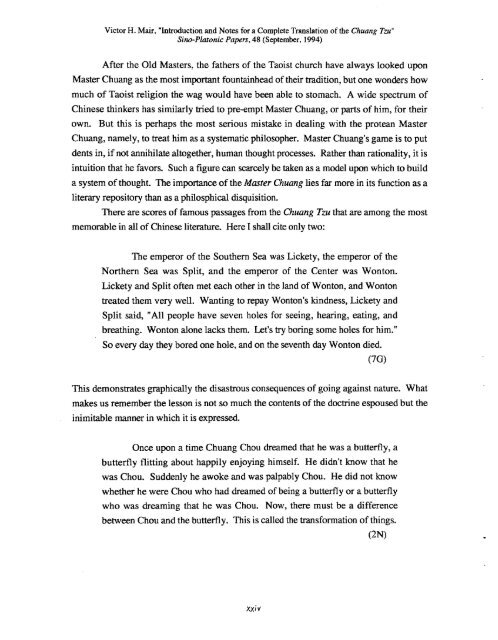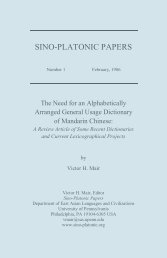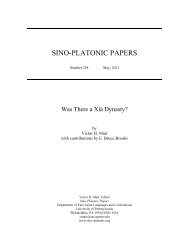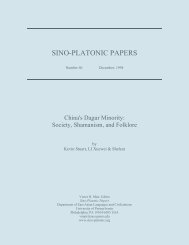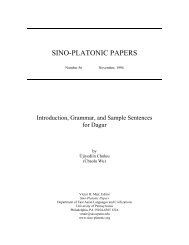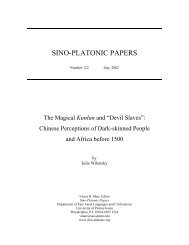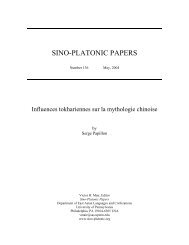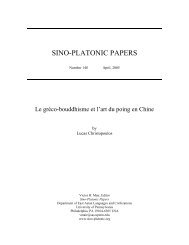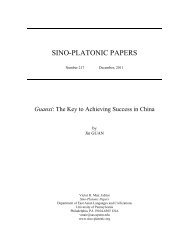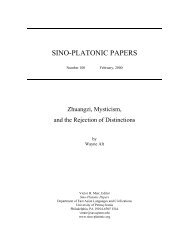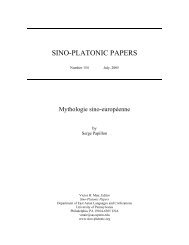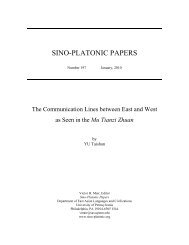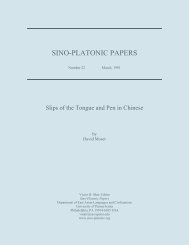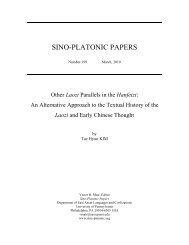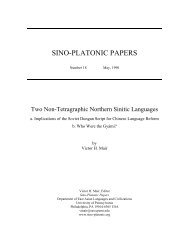Introduction and Notes for a Complete Translation of the Chuang Tzu
Introduction and Notes for a Complete Translation of the Chuang Tzu
Introduction and Notes for a Complete Translation of the Chuang Tzu
You also want an ePaper? Increase the reach of your titles
YUMPU automatically turns print PDFs into web optimized ePapers that Google loves.
Victor H. Mair, "<strong>Introduction</strong> <strong>and</strong> <strong>Notes</strong> <strong>for</strong> a <strong>Complete</strong> <strong>Translation</strong> <strong>of</strong> <strong>the</strong> CIzuang Tm"<br />
Sim-Platonic Papers, 48 (September, 1994)<br />
After <strong>the</strong> Old Masters, <strong>the</strong> fa<strong>the</strong>rs <strong>of</strong> <strong>the</strong> Taoist church have always looked upon<br />
Master <strong>Chuang</strong> as <strong>the</strong> most important fountainhead <strong>of</strong> <strong>the</strong>ir tmdition, but one wonders how<br />
much <strong>of</strong> Taoist religion <strong>the</strong> wag would have been able to stomach. A wide spectrum <strong>of</strong><br />
Chinese thinkers has similarly tried to pre-empt Master <strong>Chuang</strong>, or parts <strong>of</strong> him, <strong>for</strong> <strong>the</strong>ir<br />
own. But this is perhaps <strong>the</strong> most serious mistake in dealing with <strong>the</strong> protean Master<br />
<strong>Chuang</strong>, namely, to treat him as a systematic philosopher. Master <strong>Chuang</strong>'s game is to put<br />
dents in, if not annihilate altoge<strong>the</strong>r, human thought processes. Ra<strong>the</strong>r than rationality, it is<br />
intuition that he favors. Such a figure can scarcely be taken as a model upon which to build<br />
a system <strong>of</strong> thought. The importance <strong>of</strong> <strong>the</strong> Master <strong>Chuang</strong> lies far more in its function as a<br />
literary repository than as a philosphical ciisquisi tion.<br />
There are scores <strong>of</strong> famous passages from <strong>the</strong> <strong>Chuang</strong> <strong>Tzu</strong> that are among <strong>the</strong> most<br />
memorable in all <strong>of</strong> Chinese literature. Here I shall cite only two:<br />
The emperor <strong>of</strong> <strong>the</strong> Sou<strong>the</strong>rn Sea was Lickety, <strong>the</strong> emperor <strong>of</strong> <strong>the</strong><br />
Nor<strong>the</strong>rn Sea was Split, <strong>and</strong> <strong>the</strong> emperor <strong>of</strong> <strong>the</strong> Center was Wonton.<br />
Lickety <strong>and</strong> Split <strong>of</strong>ten met each o<strong>the</strong>r in <strong>the</strong> l<strong>and</strong> <strong>of</strong> Wonton, <strong>and</strong> Wonton<br />
treated <strong>the</strong>m very well. Wanting to repay Wonton's kindness, Lickety <strong>and</strong><br />
Split said, "All people have seven holes <strong>for</strong> seeing, hearing, eating, <strong>and</strong><br />
breathing. Wonton alone lacks <strong>the</strong>m. Let's try boring some holes <strong>for</strong> him."<br />
So every day <strong>the</strong>y bored one hole, <strong>and</strong> on <strong>the</strong> seventh day Wonton died.<br />
(7G)<br />
This demonstrates graphically <strong>the</strong> disastrous consequences <strong>of</strong> going against nature. What<br />
makes us remember <strong>the</strong> lesson is not so much <strong>the</strong> contents <strong>of</strong> <strong>the</strong> doctrine espoused but <strong>the</strong><br />
inimitable manner in which it is expressed.<br />
Once upon a time <strong>Chuang</strong> Chou dreamed that he was a butterfly, a<br />
butterfly flitting about happily enjoying himself. He didn't know that he<br />
was Chou. Suddenly he awoke <strong>and</strong> was palpably Chou. He did not know<br />
whe<strong>the</strong>r he were Chou who had dreamed <strong>of</strong> being a butterfly or a butterfly<br />
who was dreaming that he was Chou. Now, <strong>the</strong>re must be a difference<br />
between Chou <strong>and</strong> <strong>the</strong> butterfly. This is called <strong>the</strong> trans<strong>for</strong>mation <strong>of</strong> things.<br />
(2N)


